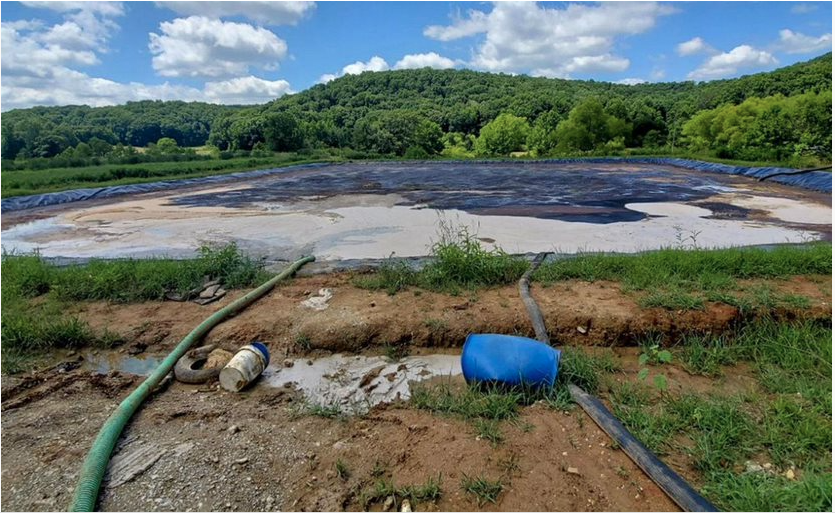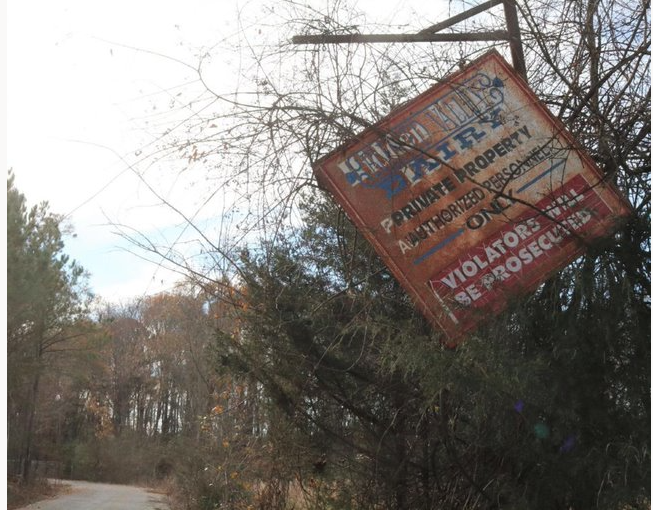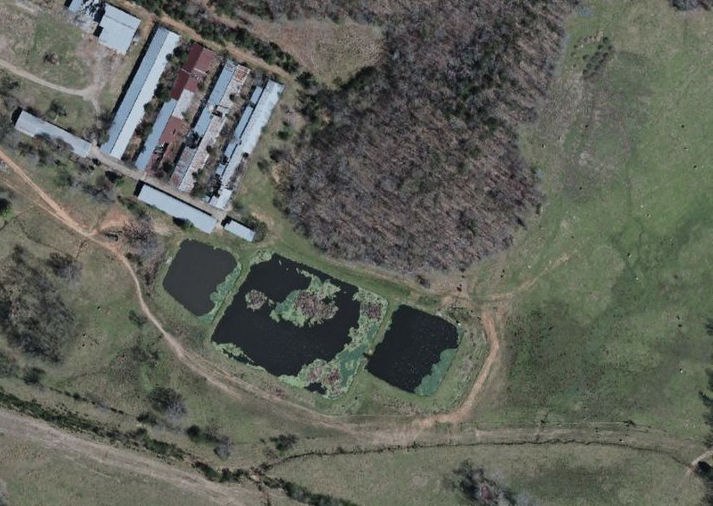‘It stinks’ Chicken sludge applied to farms raises ire of neighbors
By Eric Fleischauer
For the Enquirer
Residents near a farm in Morgan County and other farms throughout the state that are fertilized with what regulators euphemistically refer to as “beneficial food waste byproducts” say it smells like something died.
They’re right.
The poultry sludge applied to their neighbors’ land is not chicken litter. Rather, it is a slurry containing particles of the chickens themselves, along with other waste from rendering and processing plants.
“At first I didn’t know what it was,” said Janice Williams, who lives near Hidden Valley Farm in southern Morgan County. “I thought there was something dead around the house somewhere. I thought the dogs might have killed an armadillo. I searched the yard for an armadillo, but then I found out where the smell was coming from.”
Hidden Valley Farm, about five miles south of Danville, is owned by Georgia-based Recyc Systems Southeast, which in turn is owned by Arkansas-based Denali Water Solutions. It has been the subject of numerous citizen complaints to the Alabama Department of Environmental Management since Denali began spreading poultry sludge on the land last year.
Barbara Crow, who lives across Crowdabout Creek from the Denali farm, said she first became wary of the property in November 2020 when she saw numerous 18-wheeler tanker trucks entering the property, sometimes lined up as they waited to access the 1.5-mile road, gated and locked with numerous “no trespassing” signs, that is the sole entrance to and exit from the lagoons where the sludge is dumped before being applied to the land.
“They were just lined up waiting all day long. All of December and January was like that, just all the time. Then it wasn’t long before we were smelling it,” Crow said. “Then in the summertime, there were many days – and some were consecutive days – that you could not stay outside. If you were working in the yard or the garden, you’d have to go inside because you couldn’t stand it. That’s how bad it is.”
Ken Thompson, who lives across the county line just south of the farm, is one of several neighbors who has filed complaints with ADEM.
“Another great week of chicken death up here,” he wrote in a July 23 complaint. “Thanks ADEM for the smell of death up here at our homes in Cullman County … Looking forward to a weekend and running to the car so you don’t puke when the smell overtakes you.”
Another neighbor, Cranson Asherbranner, filed a complaint Aug. 13: “The smell is terrible. The amount of coyotes that it has attracted is frightening. We find dead birds all the time, now many hawks and owls. They dump that stuff at all hours of the day and night. The really nasty stuff gets dumped at night.”
Until April 2020, the application of poultry sludge on farmland was unregulated in Alabama.
Since then, regulations have been in effect that critics complain are inadequate. While the regulations prohibit application or storage of the sludge within 500 feet of inhabited buildings or within 100 feet of waterways or the property line, they require no testing of the materials being applied. The regulations leave it to the company to come up with an operation plan to minimize animals like rodents, bugs, coyotes and birds and to minimize “odors and fugitive air-borne dust.”
COMPLAINTS
ADEM has received 51 citizen complaints about Denali in the past year, almost all involving odor. The most – 20 – involved Hidden Valley Farm in Morgan County. Complaints also were filed involving Denali operations in Jefferson, Clay, Jackson, Barbour, Cullman, Russell, Etowah and Marshall counties.
The other major poultry waste distributor in the state, Synagro, has been the subject of 20 citizen complaints this year. Most involved farms in Marshall and Blount counties.
The complaints have prompted dozens of ADEM inspections but few enforcement actions.
ADEM has notified Denali of violations of the regulations a total of six times this year on farms in Morgan, Russell, Etowah, Blount, Clay and Marshall counties, generally involving violations of setback requirements. It also issued a cease-and-desist order and fined the company for alleged violations in northern Jefferson County.
Synagro has received two notices of violation this year and three warning letters.
Public concern over the sludge application led to the recent formation of a group called Alabama Waste Sludge Awareness, which had its inaugural meeting Dec. 2 in Guntersville. About 50 people attended, and most had stories about the smells emanating from farms used by Denali.
According to filings with ADEM, Denali typically transports chicken processing waste to the farms in 6,000-gallon tanker trucks. It applies the waste to farms all over the state.
On farms in Morgan, Lawrence, Franklin and Colbert counties, it applies waste from 25 different processing plants, including the Wayne Farms plants in Decatur and various Tyson plants.
According to ADEM, Denali also applies the sludge to farms in Lauderdale, Blount, Tuscaloosa, Sumter, Clay, Marengo, Etowah, Marshall and Mobile counties.
Black Warrior Riverkeeper became a leader in the fight for stronger regulatory control of poultry sludge when it began receiving complaints of foul odors coming from an old coal mine in north Jefferson County. The odor, it turned out, was the result of Denali spraying chicken processing waste on the ground there.
ADEM issued a cease-and-desist order in March and in August fined the company $34,500.
ECONOMICS
Nelson Brooke, on the staff of Black Warrior Riverkeeper, said strict regulations are necessary because poultry processors and waste distributors like Denali have an economic incentive to over-apply the sludge, which maximizes the smell.
“Dumping sludge on a large area of land can be very time-consuming if the regulations or the best practices are followed,” Brooke said. “What we found at this (Jefferson County) site and many other sites is they just don’t follow the minimal regulations that we have and the guidelines, which require this stuff to be tilled into the ground and sprayed at a smaller volume so it can adequately percolate into the ground.
“That way they can get rid of way more of it quicker, get back to the tanker truck and completely spray that whole 18-wheeler and get on to the next one,” Brooke added. “That’s cheaper for them – cheaper for the company that’s getting rid of it.”
Southern Environmental Law Center is representing Black Warrior Riverkeeper and Alabama Rivers Alliance in a challenge to the regulations ADEM issued last year and working with ADEM on possible regulations that would be stricter.
“Alabama’s regulations are the weakest in the region,” said Barry Brock, a lawyer with Southern Environmental. “Weaker than Mississippi, Georgia, Tennessee, any other state on poultry and food waste regulations. There’s no requirement for testing to know what’s in it.
“We don’t know what sort of pathogens, bacteria, E. coli; we don’t know what metals are in it. Anybody that spreads it currently doesn’t have to do any testing and submit it to ADEM. They don’t have to treat it for pathogens or bacteria.
“In other states where they do allow that kind of industrial waste to be land-applied, they at least have requirements that it be tested. Alabama’s the only place where they allow it (without having) any regulations to test it.”
Martha Hunter of Alabama Rivers Alliance said the results of those weak regulations are predictable.
“If we don’t have strong regulations, then these other states are going to bring it to Alabama, and we will be the dumping ground,” she said.
DENALI’S RESPONSE
Rickey Turner, senior project manager at Denali, said his company provides an important service that saves money for poultry processors, disposes of waste that would otherwise fill landfills and benefits farmers.
“It’s a lack of education,” he said of Denali’s critics. “As an industry, we don’t really counteract. Every single time we try to rebuttal, it always gets misrepresented. We’re always made out to be the bad guy.”
He said extensive testing requirements are unnecessary because the chicken sludge is merely food waste.
“One of the largest clients we have is the Keystone plant in Gadsden,” Turner said. “It’s where all of the McDonald’s chicken nuggets are battered and fried and packaged, at that one plant. What we land-apply from that plant is what actually somebody, if they went to McDonald’s and bought chicken nuggets, they’re eating what we land-apply. It’s flour, got some corn meal, got some cooking oil, and that’s all it is. It’s 95 percent water.”
He said Denali does some testing of its sludge, both for nutrient value and for the presence of some metals.
“I don’t agree that ADEM is lax. We have some strict guidelines,” he said. “They’re not showing the full picture of what ADEM is requiring us to do before we can even land-apply. We have to have a nutrient management plan that shows soil samples and metals in the sludge and nutrients in the sludge,” he said.
He shrugs when asked about the odor that has triggered so many complaints from people living near farms where the sludge is applied.
“What they’ve done (in some states) is put in some masking material that’s masking the odor. You can pour a 55-gallon drum of cinnamon in there, and it masks it. It’s perfuming it,” he said.
As bad as the smell is, environmental lawyer and chemical engineer Chris Nidel said it might be a positive in focusing attention on the problem.
“When you smell something, that’s a chemical, and your lungs are going to react to it,” said Nidel, who is based in Washington, D.C. “These things are not innocuous. The smell is an alarm bell for all the other problems. We’ve got to be thankful for the smell. It’s not nice when they impose it on us, but it’s just a symptom of a much bigger problem.
“They need to establish this is safe before they impose it on our communities.”
Crow, 79, was fed up with the smell and in June managed to meet with the on-site managers of Denali’s Morgan County farm. Those managers have not responded to requests by The Decatur Daily to allow entrance to Hidden Valley Farm.
Crow said they showed her three lagoons on the site. The largest was 17 feet deep, they said, with about a foot of sediment collected at the bottom.
“The middle part is what they call the beneficial water, or the nutrient-rich water, that they spread out and plow in. Then the top of it is the grease and oil and fat from all this sludge they’re putting in there that just floats on the top. It makes a crust, and it stinks,” Crow said.
The crust is touted by Denali and its subsidiary Recyc as reducing odors, according to the operations plan it filed with ADEM.
“Recyc Systems trucks will transport poultry byproduct material from various plants to the farm … Poultry byproduct will be stored in the holding pond until land application occurs,” according to the plan filed in January. “By leaving the material in the pond for extended periods, this allows the pond to create a crust on top. The crust will reduce any odor or other vector issues.”
ADEM approved the operations plan for Hidden Valley but in March noted that use of the lagoon “in a manner that leads to odor issues or other concerns at this site may cause this approval to be immediately revoked.”
Numerous complaints about odor since then have not resulted in revocation.
Crow said the on-site managers were quite polite when she visited, but she was unimpressed with the operation and the pungent smell. She filed a complaint with ADEM later the same day.
“My boots that I had on that day, I had to leave out on the porch all summer long, and just now the stink has gone away from them enough so I can wear them again,” she said.





